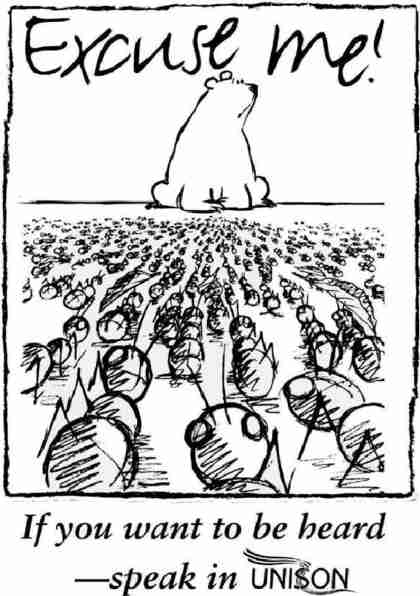
Why then have public sector union leaders, for example those in Unison and the GMB, signed up to a deal that makes further cuts to public sector pensions?
George Osborne announced in his October spending review that he wanted to cut public sector pensions to cut the debt, not in pension schemes (which does not exist), but the debt caused by the banking crisis and recession:
"From the perspective of filling the hole in the public finances, we will seek changes that deliver an additional £1.8 billion of savings per year in the cost of public service pensions by 2014-15 – over and above the plans left to us by the last government."
So why would unions sign up to cuts to public sector pensions to pay for a crisis their members had no role in causing? In effect, by signing up to the government's agenda the unions are also accepting the their argument that a bloated public sector caused the crisis.
But, you may ask, didn't the unions wrangle concessions out of the government? Not according to the government's lead Minister in the dispute, Treasury Secretary Danny Alexander:
The heads of agreement deliver the Government’s key objectives in full, and do so with no new money since our November offer. In future, scheme pension ages will match the state pension age and schemes will be on a career average basis; all the agreements are within the cost ceiling that I set in November, and will save the taxpayer tens of billions of pounds over the decades to come.
Danny Alexander said on 2 November that he was announcing his final offer. So these fake negotiations since have not gained a single penny extra. If not worth signing up to on 2 November, why sign up now?
In a dispute about working longer and paying more for a worse pension, Danny Alexander has won on all three counts. As he told the House of Commons:
"We have already made some changes that deal with short-term pressures, including changing the basis of pension uprating to the consumer prices index and increasing member contributions by 3.2 percentage points, phased over three years. Those proposals are unchanged ... In future, scheme pension ages will match the state pension age"
So on each of the key questions union members should be asking what has my union (in the case of Unison, GMB, ATL, FDA and others) gained so that it could recommend this 'deal' (more honestly described as total capitulation)?
What's more, an emboldened Danny Alexander proudly announced the true political agenda behind the pensions reforms his government sought: "The new pensions will be substantially more affordable to alternative providers". So in signing up to this scheme, union leaders are facilitating the privatisation of their members' jobs as well as the theft from their pensions.
Union members, and even union excecutives, of course have yet to have their say on the proposals, so at the moment this backroom capitulation has yet to be signed off. Union branches and trades councils are already organising for a no vote and to put pressure on their executives, so their leaderships may have to fight again.
To date though, it is a tragic reflection of the UK's trade union leadership that after the biggest strike for a generation, there is an utter vacuum where an industrial action strategy should be. Capitulation now, will leave the government emboldened to cut more jobs, privatise more services, and further constrain pay.
No comments:
Post a Comment